An authorization letter to act on behalf is a formal document that grants someone else (an agent or attorney-in-fact) the authority to perform certain tasks or actions on behalf of an individual (the principal).
This letter is alternatively referred to as a letter of authorization or power of attorney. It is used to define the scope and limitations of the transferred legal authority. This is often necessary when you cannot personally attend to certain matters due to reasons such as physical absence, medical conditions, or other commitments.
In this article, you will learn about instances where you can use a letter of authorization to appoint someone to make decisions or take action on your behalf. You will also gain insights into the different elements of such a letter to ensure that your authority is effectively conveyed to the authorized party as you intend.
Instances Where Authorization to Act on Behalf Prove Indispensable
An authorization letter can be used in different situations where you require someone to act on your behalf or represent you. This letter may thus be issued for legal, financial, medical, or administrative purposes.
Some common situations where an authority letter might be needed include:
Legal matters
You may need to authorize someone to represent you in legal proceedings. This could involve appointing an agent to sign legal documents, engage legal authorities, or make decisions related to legal matters. This appointment ensures that your interests are protected during the legal proceedings.
Medical decision making
In case of a medical emergency or incapacitation, you might authorize a family member or trusted individual to make medical choices on your behalf. The letter ensures that proper medical decisions can be made in accordance with your wishes.
Business transactions
If you are a business owner, you will likely not be physically available for each transaction. Therefore, you can use this letter to authorize an employee or partner to sign contracts, make business decisions, or conduct transactions on your behalf. This ensures the timely completion of transactions and proper representation in situations where your physical presence is not feasible.
Authorization Letter Templates
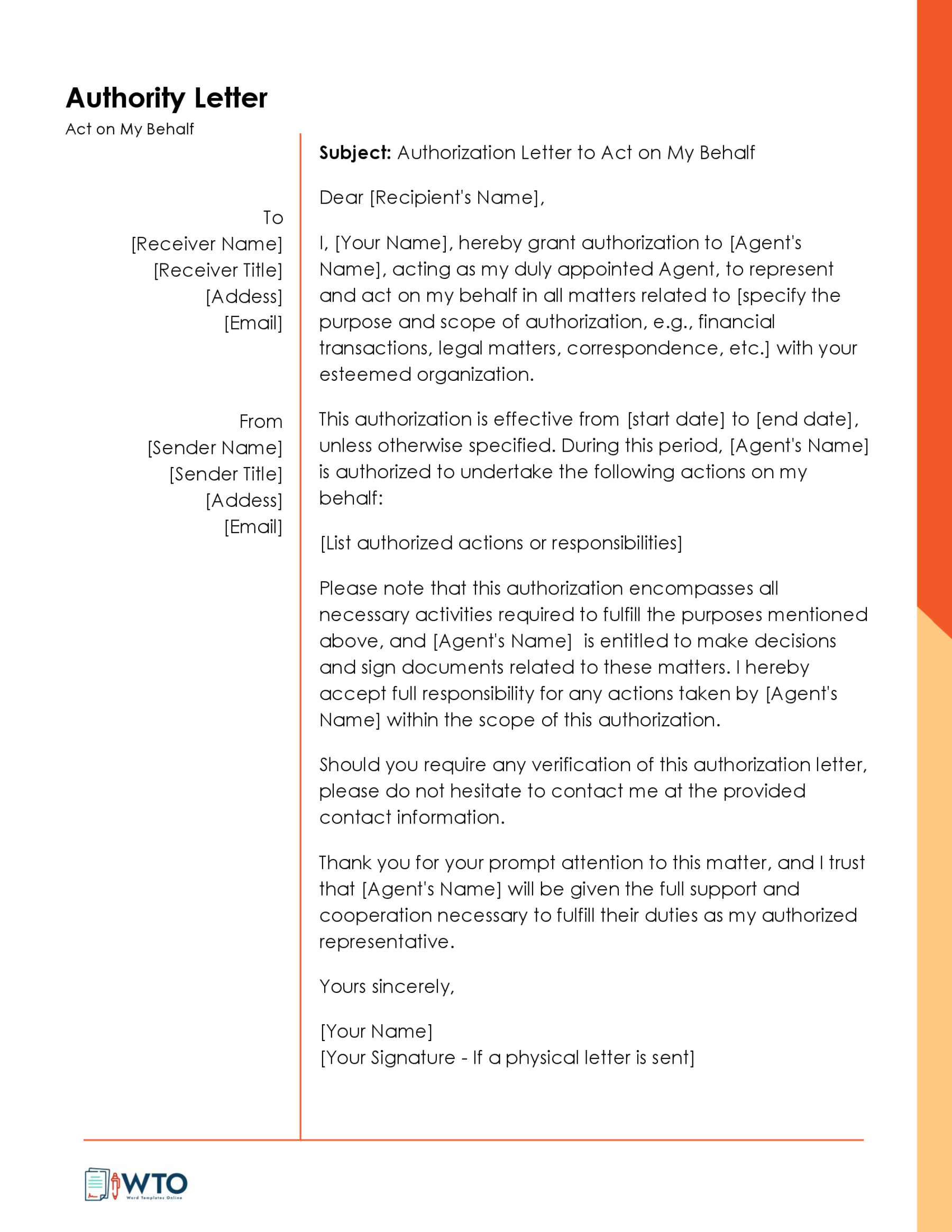
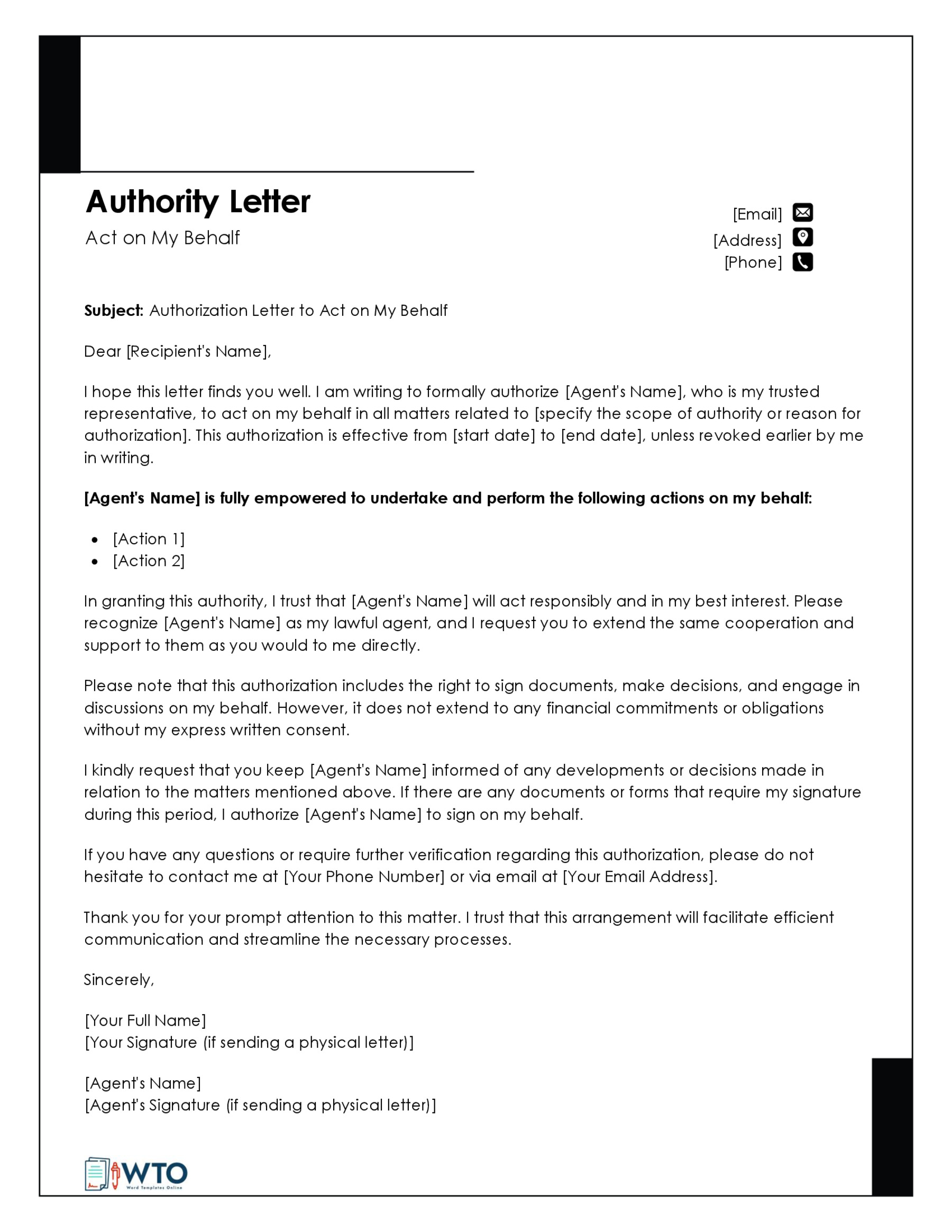
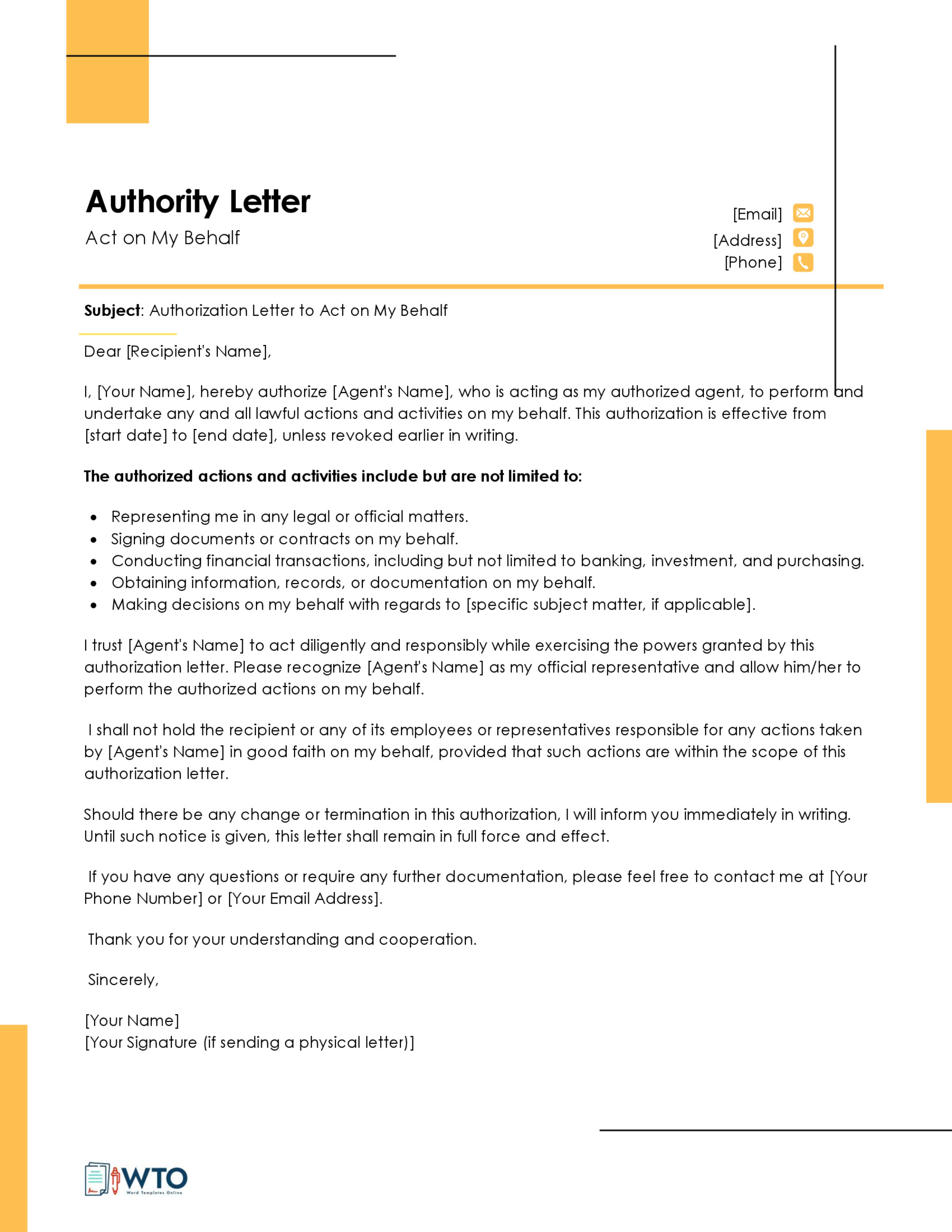
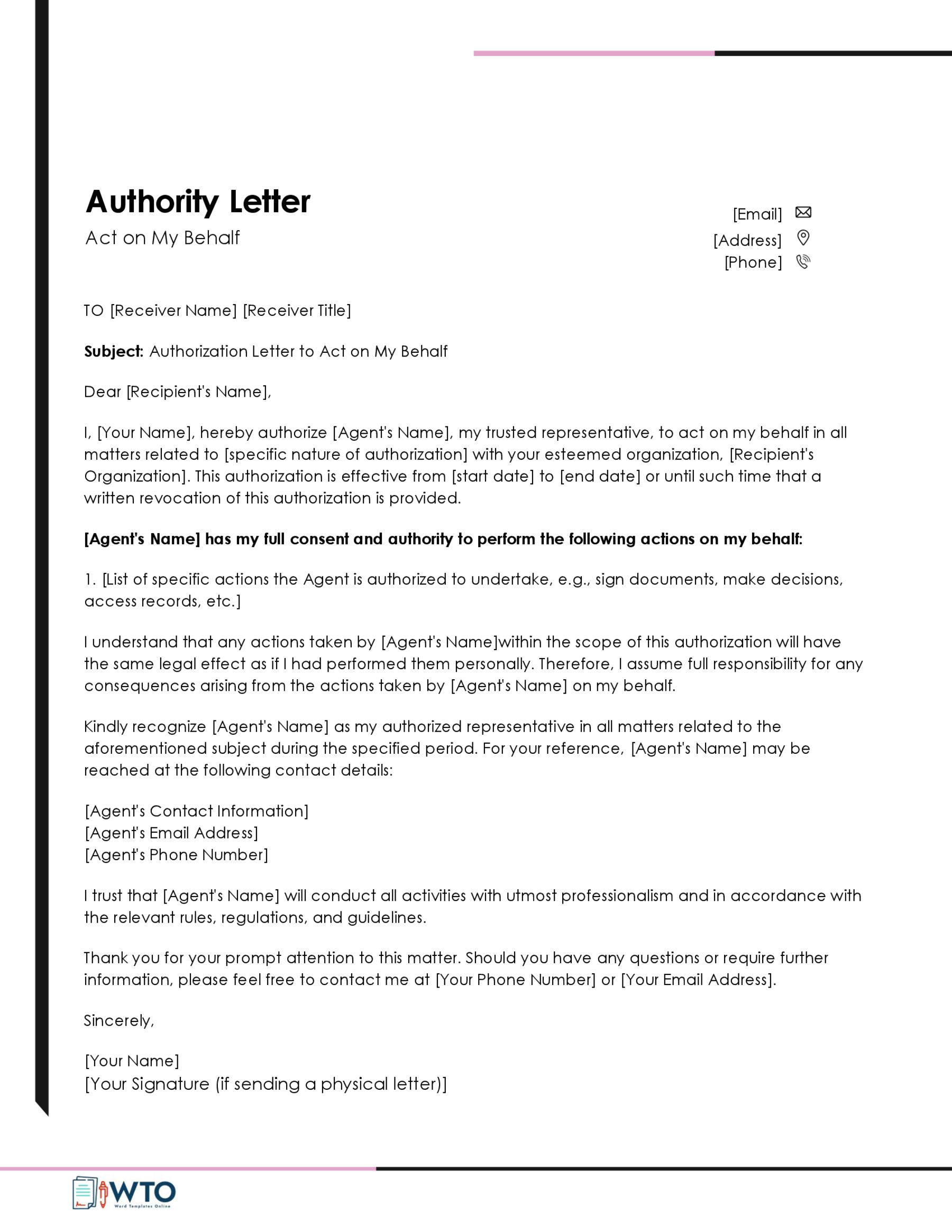
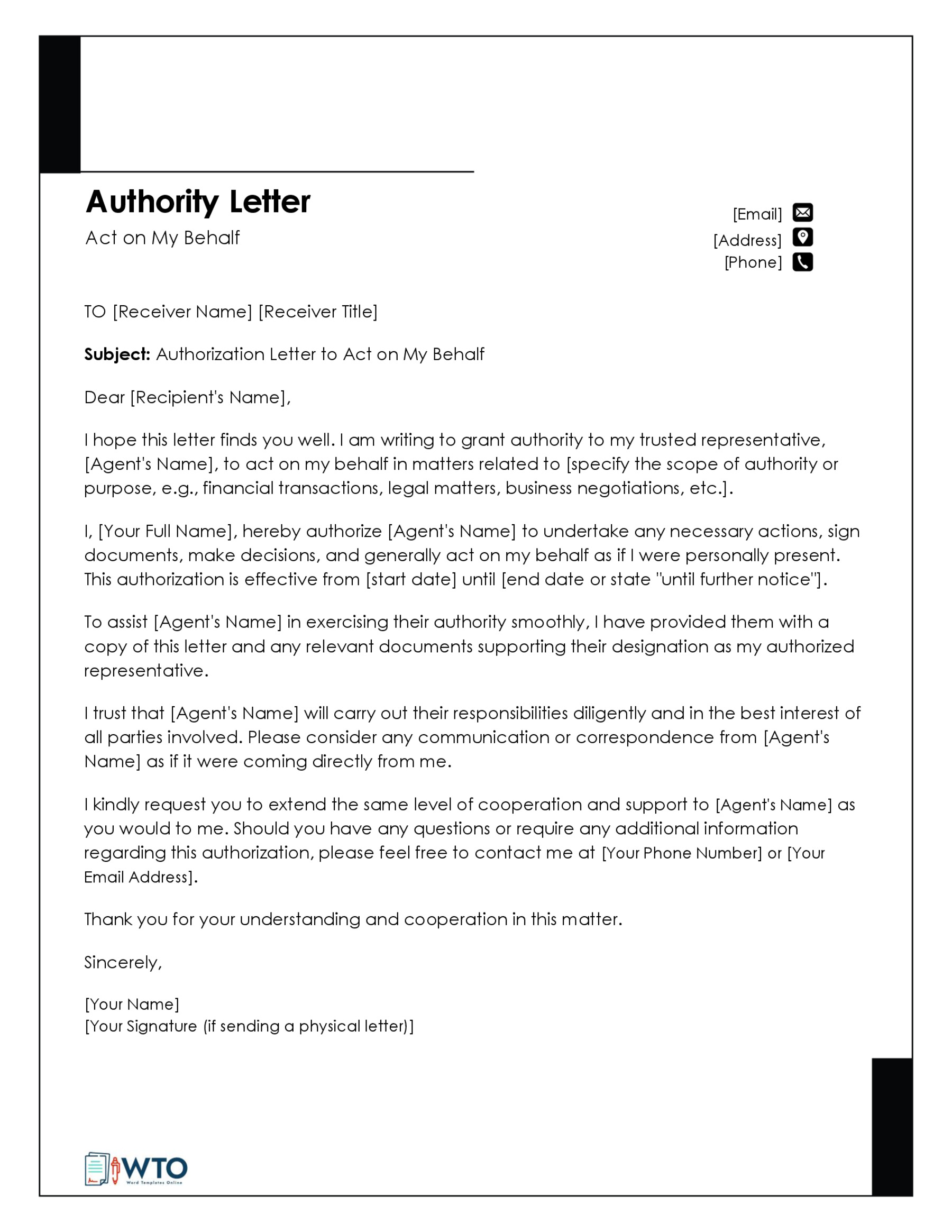
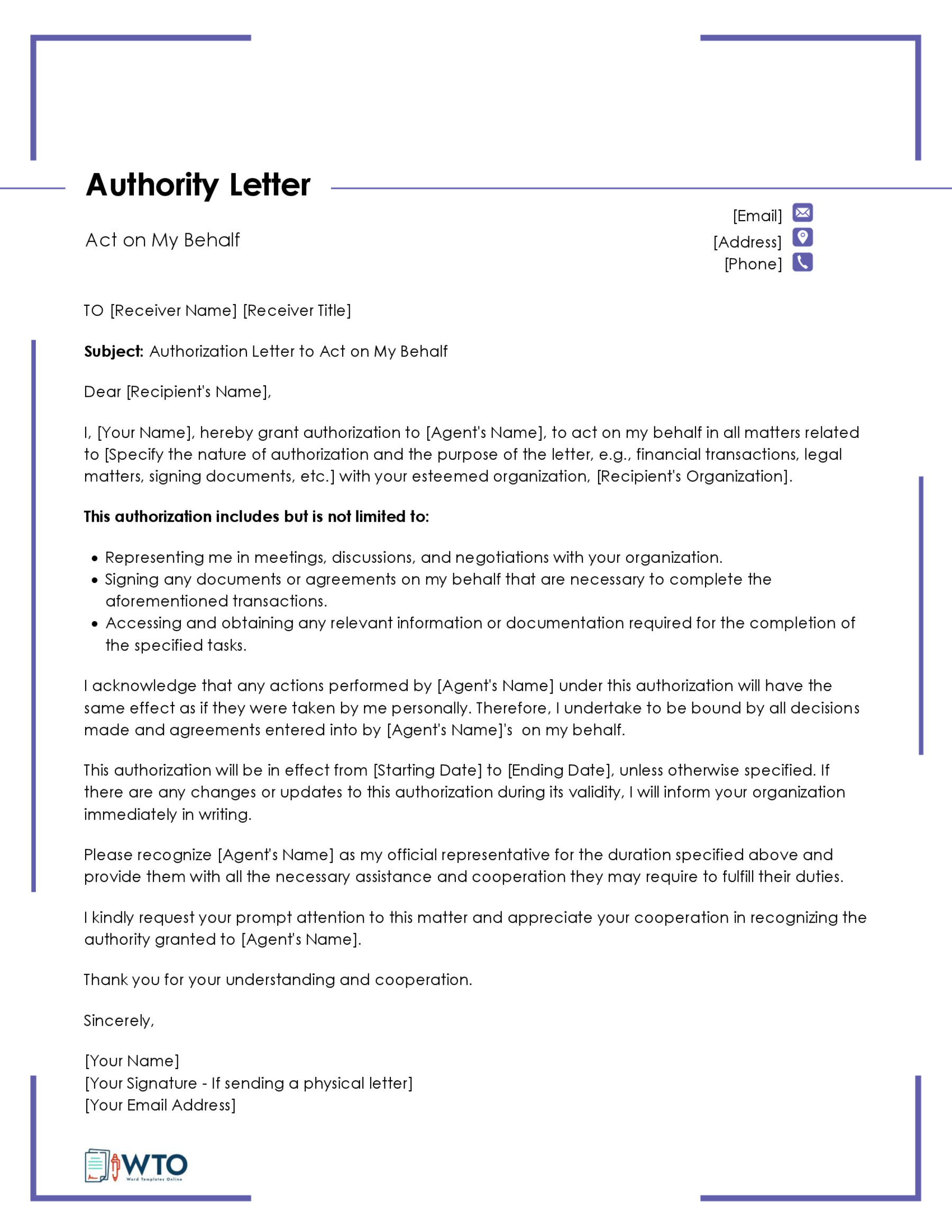
Authorization Letter Samples
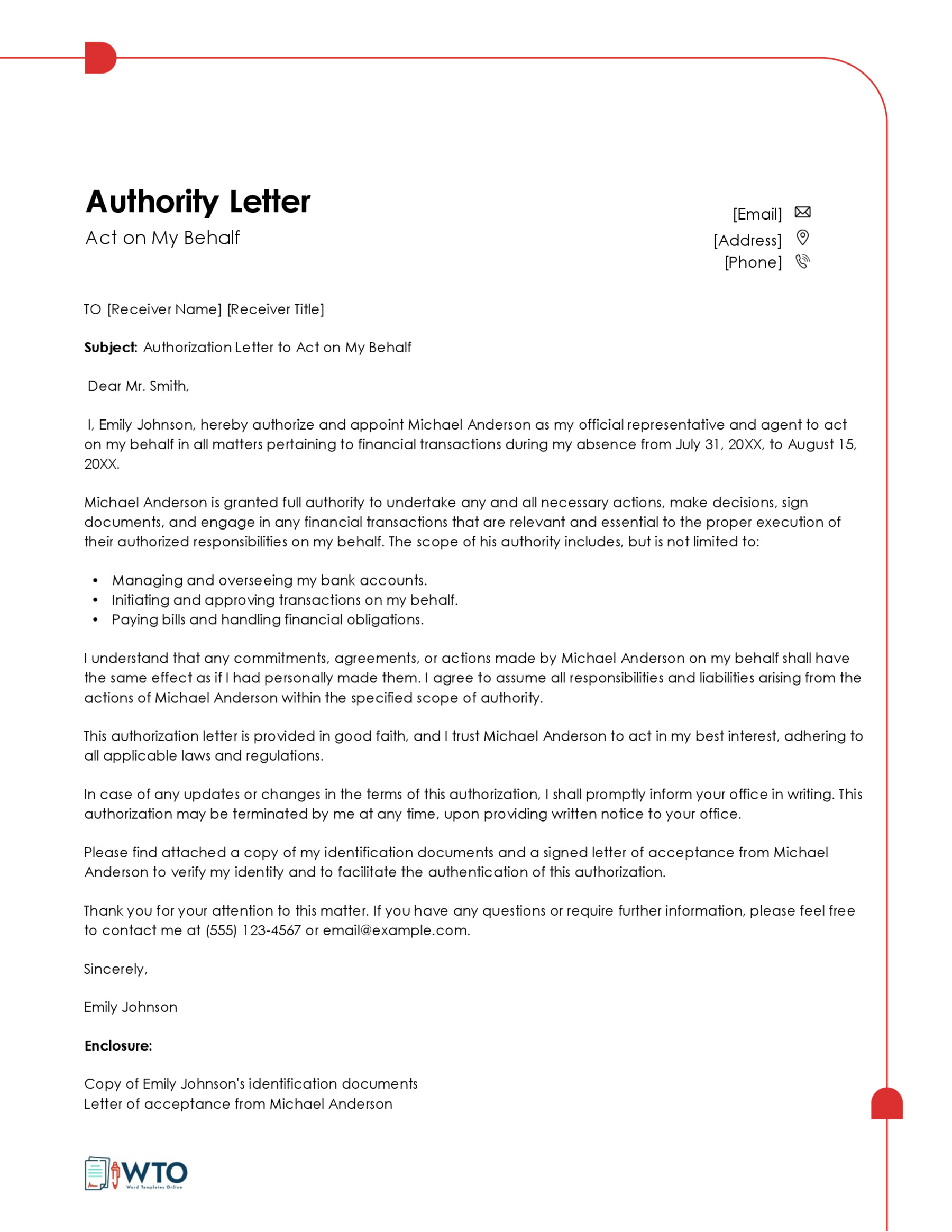
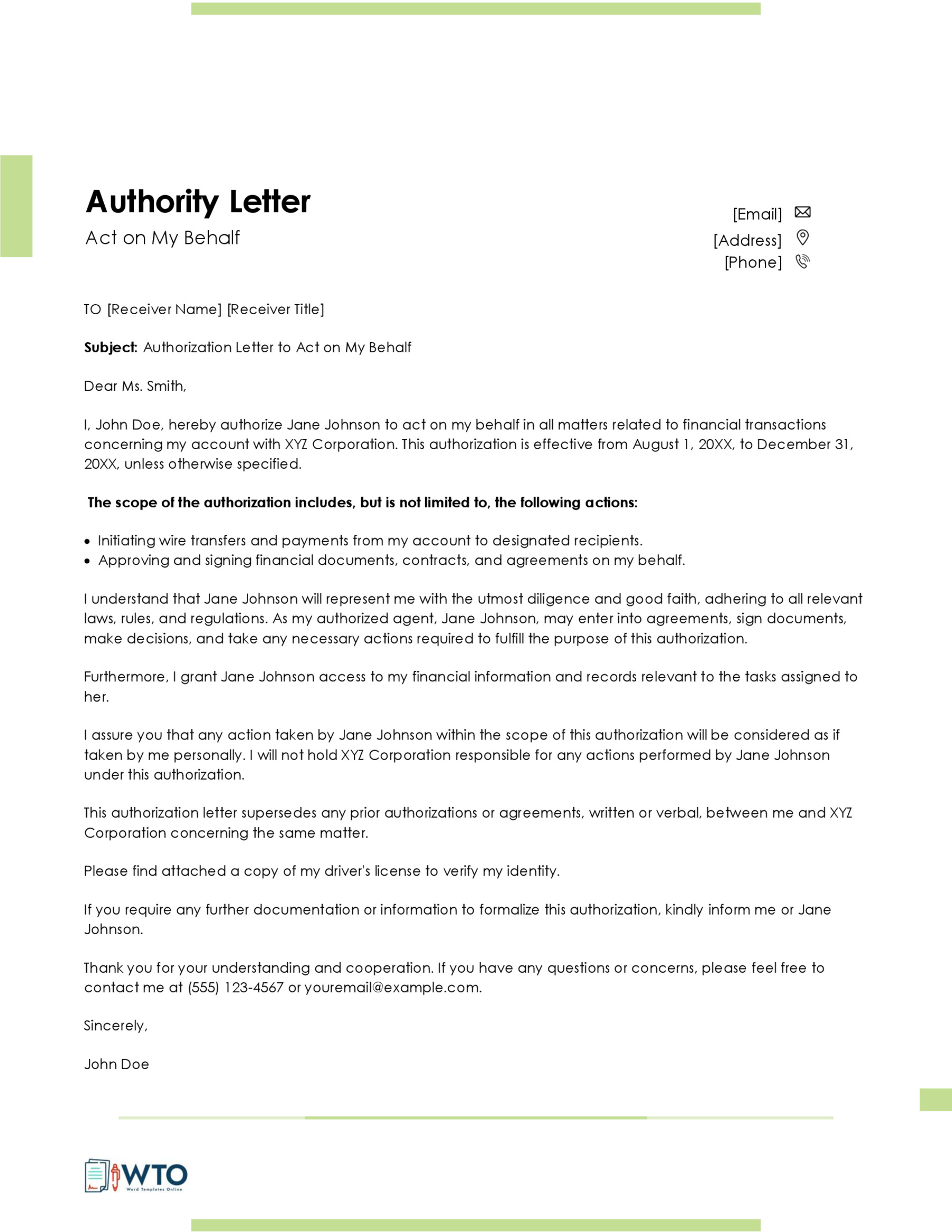
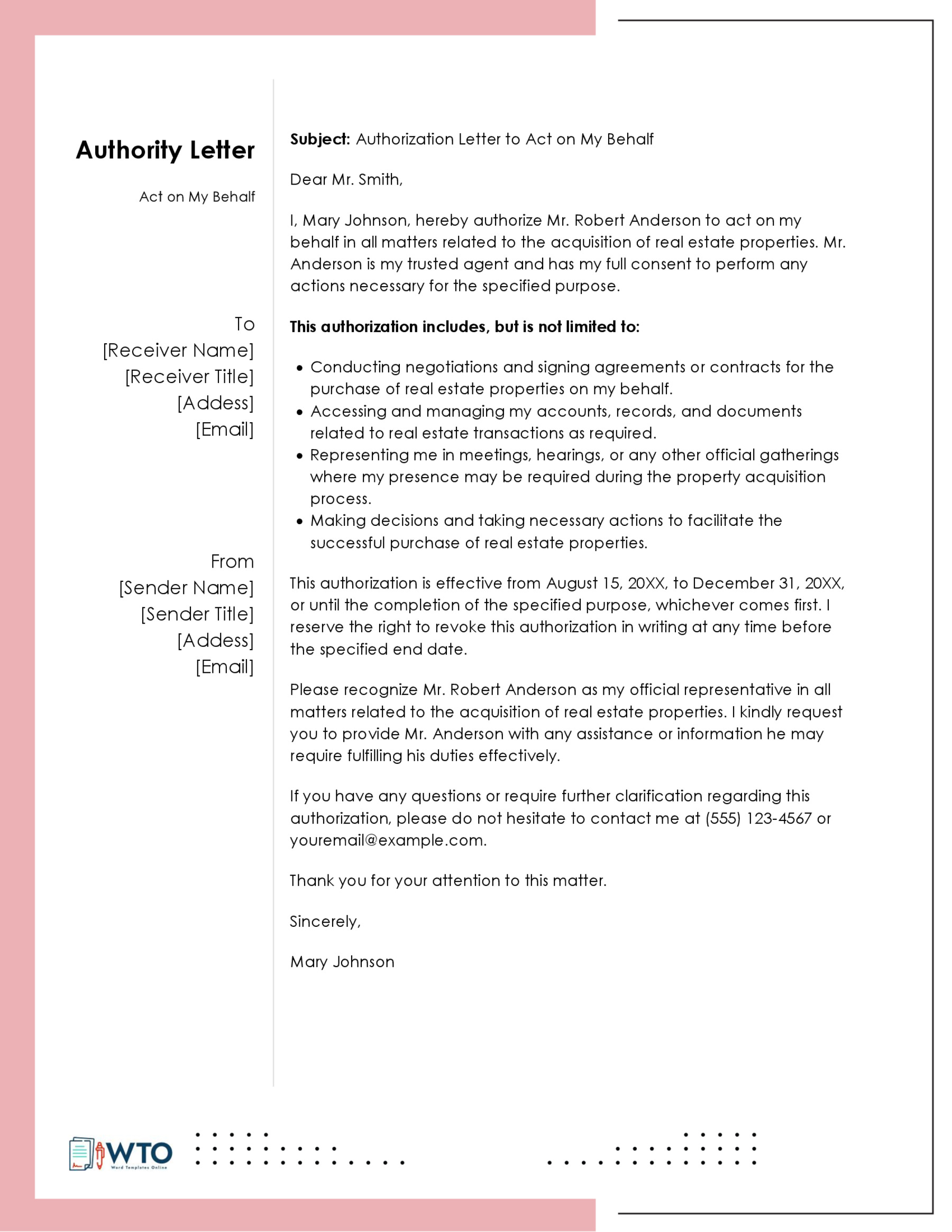
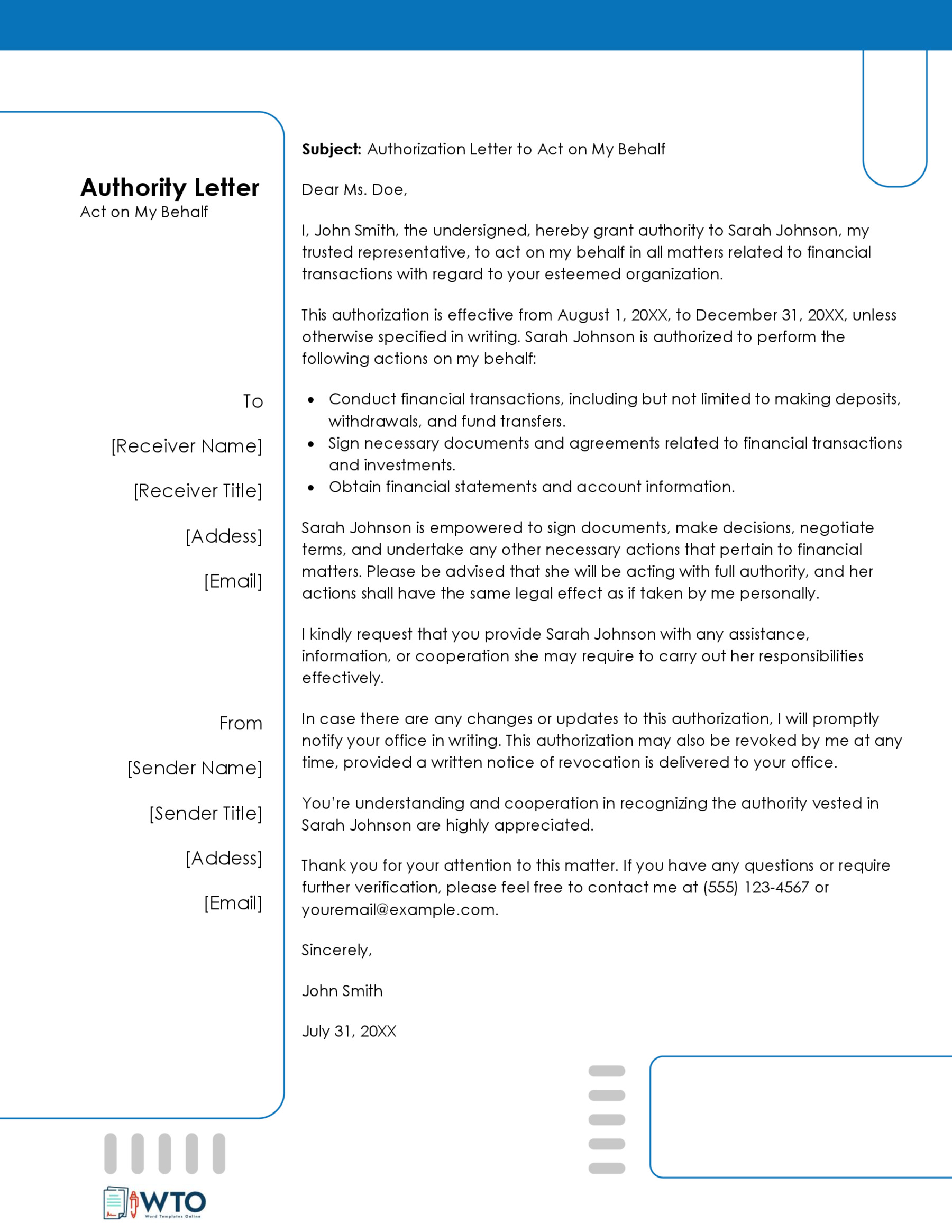
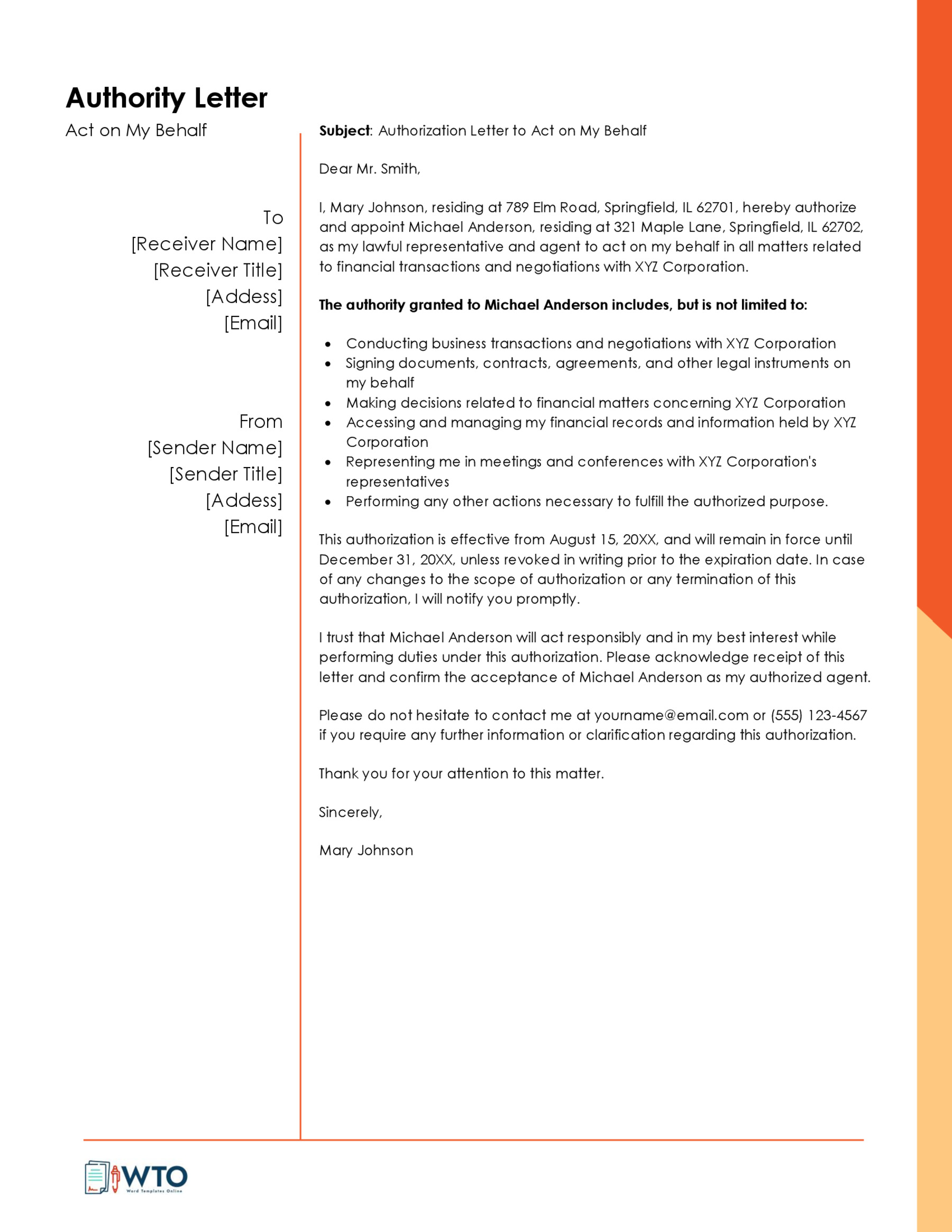
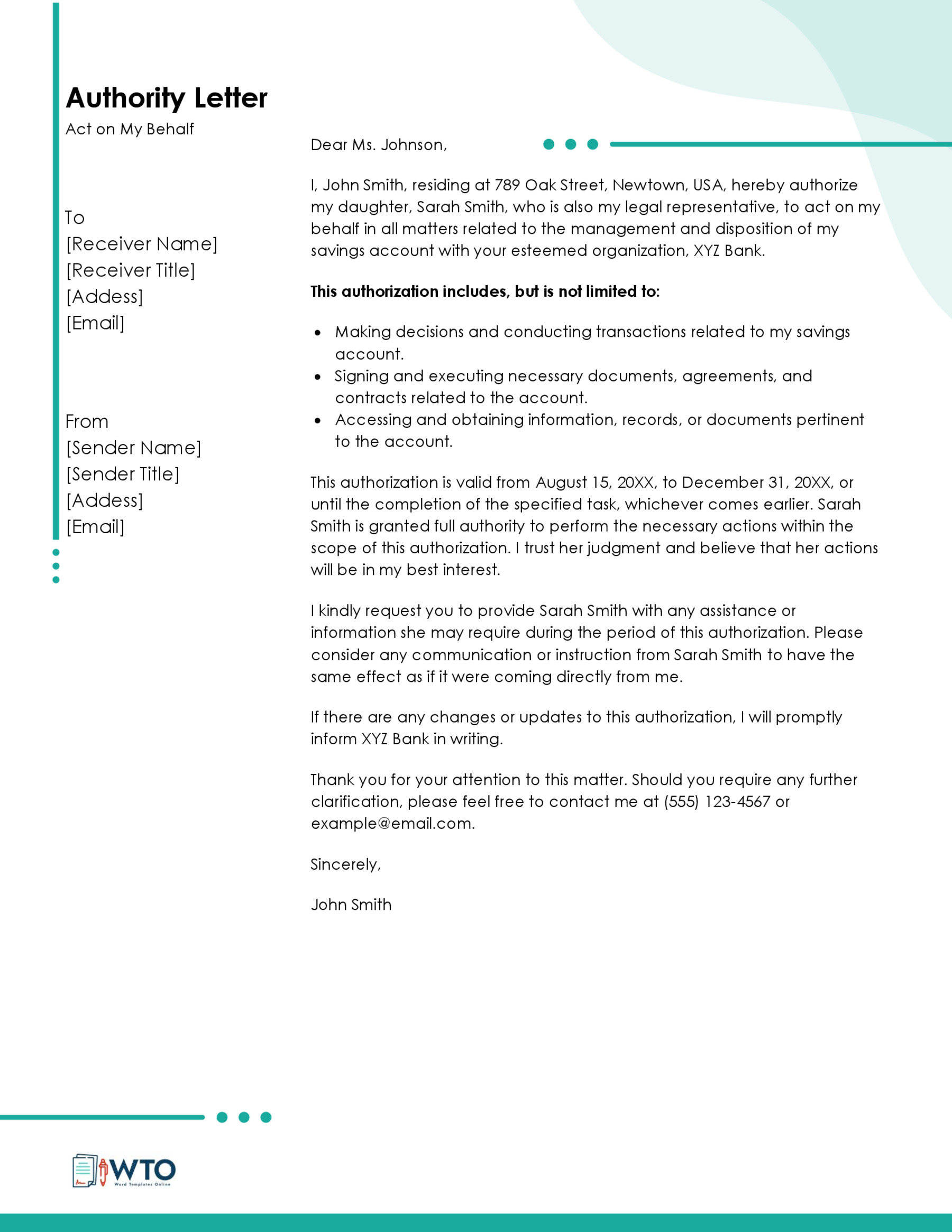
7 Basic Elements of an Authorization Letter to Act on Behalf
An authorization letter should be clear and precise in detailing the tasks, limits, and timeframes for which the authorization remains effective. To achieve this, the letter typically includes the following key elements to ensure clarity, legality, and accuracy.
Identification of the parties
The letter should begin with an accurate identification of the principal (you, the person granting the authorization) and the authorized person (the individual or entity receiving the authority). For both parties, provide the name, contact information, and other identification information such as IDs, employee numbers, or passport details. Ensure that these details align accurately with those found in legal and official documents.
Statement of authorization
This is the section where you explicitly grant the authorized person the authority to perform certain actions on your behalf. Accomplish this by specifying the roles of each party in the arrangement and the scope of the authority. Define the scope by enlisting tasks or decisions the agent is permitted to undertake. If there are any actions that the authorized individual must refrain from, clearly stipulate these limitations. The language in this section should be clear, concise, and unambiguous.
Duration of authorization
Indicate the time frame during which the authorization remains valid. This could be a specific date range or an open-ended/ongoing authorization. The authority can also be designated for single-use only. Defining a period of validity prevents the misuse of the authority entrusted to the agent.
Revocation clause
Within this section, enlist the circumstances under which the authorization can be revoked or terminated. Additionally, details the revocation process itself. Specify that the revocation must be documented in writing, along with the notice period in terms of days, and the preferred mode of communication. This clause ensures that you retain control of how long the agent holds the authority.
Notarization or witnessing
Depending on the legal requirements or the nature of the authorization, it might be necessary to have the letter notarized by a public notary or witnessed by one or more neutral third parties. This inclusion enhances the credibility and authenticity of the authorization. However, the notary public or witness(es) must sign the letter.
Contact information
Provide up-to-date contact information for both you and the agent. This information allows third parties to reach out for any clarification or communication.
Any specific requirements
Lastly, the letter should communicate any specific guidelines or prerequisites needed to complete and exercise the authority. Additionally, relay any directives stipulated by the organization or institution where the authorization will be utilized. These instructions serve as documentation for activities or instances wherein your approval is mandatory before the agent can proceed with a task or decision.
Authorization Letter Template
[Your Name]
[Your Address]
[City, State, Zip Code]
[Email Address]
[Phone Number]
[Date]
[Recipient’s Name or Institution’s Name]
[Recipient’s Address or Institution’s Address]
[City, State, Zip Code]
Subject: Letter of Authority to Act on My/Our Behalf
Dear [Recipient’s Name or Institution’s Name],
I/We, [Your Full Name(s)], hereby grant [Name of Authorized Person], holding Identification Number [ID Number/Passport Number], the authority to act on my/our behalf in regards to [specify the nature of the authority, e.g., managing financial transactions, representing me/us in legal matters, handling property affairs, etc.], effective from [Start Date] until [End Date, if applicable].
This letter authorizes [Name of Authorized Person] to perform actions including, but not limited to, the following:
[Clearly list the specific actions or decisions the authorized person can make.
For example:
Signing documents related to [specific matter]
- Accessing information regarding [specific account, property, or case]
- Making decisions concerning [specific matter or decision area]
- Representing me/us in discussions and negotiations with [specific parties or institutions]]
Please note that this authority is granted within the limits of [specify any limitations or conditions, if applicable], and does not extend beyond the scope mentioned herein.
I/We affirm that [Name of Authorized Person] has the right to act in my/our capacity regarding the matters specified above and request all parties concerned to recognize this Letter of Authority. Any and all acts carried out by [Name of Authorized Person] on my/our behalf shall be treated as if they were performed by me/us directly.
For verification purposes or if further information is needed, please do not hesitate to contact me/us directly at [Your Contact Information].
Thank you for your attention to this matter and your cooperation.
Sincerely,
[Your Signature]
[Your Printed Name]
[Your Title/Position, if applicable]
Notarization block
State of ____________
County of ___________
On this, the ___ day of _________, 20, before me, a Notary Public, personally appeared [Your Full Name] and [Name of Authorized Person], known to me (or satisfactorily proven) to be the person(s) whose name(s) is/are subscribed to the within instrument and acknowledged that he/she/they executed the same for the purposes therein contained.
In witness whereof, I hereunto set my hand and official seal.
[Notary Signature]
[Printed Name of Notary]
Notary Public
My Commission Expires: ___________
Sample Letters
Sample 01
Subject: Authorization to Collect Money on My Behalf
Dear Branch Manager,
I, Maria Gonzalez, am writing this letter to formally authorize Mr. Alex Ramirez, who holds Identification Number AZ-987654321, to collect the amount of $2,500 from my savings account (Account Number: 123456789) at Newtown Bank. This authorization is valid for the transaction scheduled on March 10, 20XX, only.
Mr. Ramirez has my full consent to sign any documents required on my behalf for this specific transaction. I trust that all necessary precautions will be taken to verify his identity before completing the transaction.
Please ensure that a receipt is issued in his name, confirming the transaction has been executed as authorized. I would appreciate it if you could send me a confirmation email at maria.g@example.com once the transaction is successfully completed.
Should you require any further information or clarification, please do not hesitate to contact me directly at (555) 123-4567.
Thank you for your attention to this matter and for your cooperation.
Sincerely,
[Signature]
Maria Gonzalez
Notarization block
State of Arizona
County of Maricopa
On this, the 6th day of March, 20XX before me, Nancy Drew, a Notary Public, personally appeared Maria Gonzalez, known to me (or satisfactorily proven) to be the person whose name is subscribed to the within instrument and acknowledged that she executed the same for the purposes therein contained.
In witness whereof, I hereunto set my hand and official seal.
[Notary Signature]
Nancy Drew
Notary Public
My Commission Expires: March 31, 20XX
Sample 02
Subject: Authorization for Company Representation
Dear Sir/Madam,
I, Thomas Reid, CEO of Reid Technologies, hereby authorize Ms. Emily Watson, our Director of Marketing, to represent Reid Technologies at the Global Tech Expo 2024, including all related preparatory meetings, discussions, and decisions regarding our participation and exhibition setup. Ms. Watson’s Identification Number is CA-2468101214.
Ms. Watson is fully authorized to act on behalf of Reid Technologies in all matters pertaining to our involvement in the Expo, including but not limited to, signing contracts for space rental, arranging for equipment hire, and approving marketing materials for distribution.
This authorization is effective from March 10, 20XX, until the conclusion of the Expo on March 20, 20XX. We kindly request all parties involved in the Expo to recognize Ms. Watson’s authority to make decisions and act in the best interest of Reid Technologies during this period.
For any verification or queries related to this authorization, please feel free to contact me directly at (600) 789-0123 or via email at thomas.reid@reidtech.com.
We look forward to a successful participation in the Global Tech Expo 20XX and appreciate your support in facilitating this representation.
Sincerely,
[Signature]
Thomas Reid
CEO, Reid Technologies
Notarization block
State of California
County of Silicon
On this, the 6th day of March, 20XX, before me, Lucas Green, a Notary Public, personally appeared Thomas Reid, known to me (or satisfactorily proven) to be the person whose name is subscribed to the within instrument and acknowledged that he executed the same for the purposes therein contained.
In witness whereof, I hereunto set my hand and official seal.
[Notary Signature]
Lucas Green
Notary Public
My Commission Expires: July 15, 20XX
Analysis
These authorization letters are effective samples because they clearly and concisely communicate the intent, the authorized individual, and the specific permissions granted. Each letter begins with a direct address to the intended recipient, providing a professional and formal tone right from the start. The use of the subject line offers an immediate understanding of the letter’s purpose, aiding in quick recognition and appropriate handling by the recipient.
The body of each letter specifies the authorizer’s details, the authorized person’s name and identification number, and the exact scope of the authorization. This precision ensures there’s no ambiguity about what the authorized individual is permitted to do, enhancing the letter’s effectiveness and reducing the risk of misunderstandings.
Additionally, both samples include a notarization block, which adds legal acknowledgment to the actions being authorized. The notary public’s signature and seal validate the identity of the person granting authorization and their acceptance of the letter’s contents, providing an added level of security and trust to the transaction or representation being authorized.
Finally, the inclusion of contact information invites further communication if clarification or additional information is needed, showing a willingness to ensure everything proceeds smoothly. This approach underscores the authorizer’s responsibility and care in facilitating the authorized actions, contributing to the overall effectiveness of these letters as tools for granting permissions in a formal, recognized manner.
Types of Authorization Letters to Act on Behalf
Authorization letters allowing an individual to act on your behalf can cover a wide range of situations and responsibilities. Regardless of the circumstances, the letter’s purpose remains constant – to grant authority to the agent to act on the principal’s behalf.
Below are some common types of authorization letters that you can write:
Authorization letter on behalf of a company
This letter of authorization is used to confer authority to a designated individual, typically a company executive or manager. It allows them to undertake predefined actions, negotiate contractual terms, and represent the corporate entity in transactions and engagements.
Authorization letter to sell property
With this letter, the property owner (principal) awards a designated agent (authorized person) with the fiduciary power to execute property sale transactions. Typically, the agent is permitted to initiate negotiations, market, negotiate, execute sale agreements, convey title, and perform requisite documentation, representing the principal’s interests by property sale guidelines and laws.
Letter of authority to sign documents on my behalf
This letter empowers the agent to execute signatures on designated documents for the principal. It delineates the authorization parameters, ensuring alignment with the principal’s stipulated directives. Such a letter expedites paperwork processing in the principal’s absence.
Letter of authority to collect money on my behalf
Such a letter explicitly grants the agent to collect payments, debts, or deposits on the principal’s behalf. This letter streamlines the collection of money, especially when the authorizer is unable to do so themself.
Power of attorney authorization letter
This document delegates authority to the attorney-in-fact to execute binding legal acts and decisions on your behalf. Such a letter is often used in legal and financial matters. Additionally, it can be applied for general purposes or limited to specific tasks or duration.
Letter of authority from the property owner
A property owner can use this type of letter of authority to allow a second party to access and perform certain tasks within the premises. Such a letter is needed for activities such as maintenance, repairs, or other authorized uses.
Frequently Asked Questions
It is a letter that legally permits someone to take necessary action on behalf of someone else.
This letter usually comes in handy when someone cannot or is unwilling to partake in certain things by themselves, thereby choosing to delegate the task to others.
In most cases, the appropriate answer would be YES. The reason is that the person signing the letter willingly did so without being forced. Therefore, they have to abide by it.
Such a letter does not necessarily need to be attested. However, if the authorized person’s actions carry huge risks, it is crucial to attest to the letter with a notary. At least two people should witness the authorization.
Final Thoughts
An authorization letter enables you to entrust a reliable individual or entity with the responsibility for specific tasks or decisions within various legal, financial, and medical contexts. This ensures that your wishes are upheld and decisions are made in your best interests. The agent’s actions are recognized as legally binding upon authentication of the principal’s intent. Therefore, it is essential to meticulously outline the authorization’s scope, duration, and limitations while also adhering to property laws and contractual obligations. Ultimately, strict adherence to existing legal procedures, jurisdictional norms, and applicable standards is crucial during the drafting and execution of such documentation.











